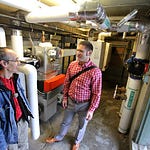Dear people,
Recently I explored the idea that there might be moments particularly productive of change. A break in routines, because of a life transition (a new job, new house, new kid) or because of a societal crisis (say, a pandemic or, uhm, apocalyptic wildfires). The result of that exploration was, in a nutshell: yes, certain moments can make change possible, but not as much as you might think.
The limited reach of these transitional moments comes down in large part to the fact that a lot of the execution of what we might want to do (differently) actually depends on the wider ‘infrastructure’ of our lives: our homes, our local transportation system, the energy grid, but also our social relations: the people we live with or the requirements of our job.
If that’s the case, why not flip the question of potential change on its head? The research I discussed earlier focused on individual life transitions. What if we looked at collective life transitions? Could a community wreak greater change? Have we really plumbed the depth of what change people are capable of?
To address this question, Beatriz Pineda Revilla designed a number of interventions in three different ‘communities’ in Amsterdam, as part of her (recently defended) doctoral research: in a sustainability Facebook group, with two neighbourhood organizations, and among a group of “self-builders” of sustainable houses. She didn’t break their routines – a routine matter of research ethics – but she did try to create other ‘windows of opportunity’, as she calls it. What she wanted to do instead then, was to create fissures in discursive conventions. The key idea here is that, firstly, we might not even have the language to think about change in the first place, and secondly, that such language needs to be communally grown.

Researchers taking an interventionist approach. Visuals here from the CODALoop project that Beatriz’s research was a part of.
Let’s take a closer look (I would have said if I were on YouTube).
Note: today’s newsletter reflects my interview with Beatriz (two weeks ago, before I went on a much-postponed break from my home, which explains my longer than usual absence from your inbox). We taped the conversation, so you can also listen to it by clicking on the play button above or get it wherever you listen to podcasts. You’ll get more of Beatriz and less of me, double the value!
So, what if we did give people a language to think about sustainability and energy? Would that allow them to re-think their position? One of the ways Beatriz tested this hypothesis is through.. an energy quiz!
The participants in this particular quiz consisted of the (regular) visitors to a community neighbourhood organization that worked to strengthen social bonds among vulnerable groups, whether it’s women who provided intensive care for a loved one, and had little time and space to build their own community, people with a mental disability, or migrant women from Turkey with poor Dutch skills.
We worked with a comedian [in order to make] the topic of sustainability and energy consumption more approachable to an audience that would have never gone to a lecture on sustainability or on energy consumption. So, by organizing a setting that was entertaining, fun, and easy – a nice evening – it allowed us to bring to the surface topics that otherwise would not have been brought up. So, for example, ‘how long do you shower? Is eight minutes, the average in the Netherlands, normal for you?’ So, in the audience there were reactions like “Eight minutes? Wow, I spend at least 15!” or “Oh, no, eight minutes is quite okay. I take even less time”. You get new kinds of interactions.

New kinds of interactions.
Now, the way we talk about things betray norms to which we more or less consciously adhere.
Do we consider eating meat normal or not, because we belong to a community of vegetarians? Do we think it normal to fly to Bali every summer or do we go to the Ardennes [in neighbouring Belgium] by train?
If you can open up these norms (8 minutes?) to collective examination, by encouraging people to put into words these more or less conscious norms, you might just create some wriggle room for people to consider alternatives as well. Leaning on the work of anthropologist Richard Wilk, Beatriz calls this process cultivation.
A decent life
One important thing to remember in these collective examinations is that the answers (and confirmation from their peers) that people will look for are fundamentally about people’s evaluation of what is a good – or decent – life.
In one of the meetups the sustainable (Facebook) community, we discussed the different types of appliances that the people have at home, and which ones were more energy consuming. Then we would ask questions such as, ‘if you could choose only of two devices, which ones would you choose?’ This type of questions put the participants into a state of mind that forced them to really think more minimally, to think ‘Okay, if this is now the situation so I cannot have like 10 devices, what would be my real needs’. What do I need for a ‘good life?’, as people often put it.
And that frame – what is a good life, Beatriz suggests, is actually a quite powerful one.
I think talking of decency allows us to go to a place where there is no blame or guilt. It is more uplifting, the idea that we can also live a good life with less. So it was interesting to see how a small group of members were into, say, ‘alternative hedonism’: living with less, because it gives you pleasure. One example was this lady who was saying how she chose a smaller house to have a smaller mortgage to have more freedom to work less. She could have the extra time to do volunteering or a hobby, which made her happy.
Note that decency can also work as a language of change for those who have to live with less because of poverty (rather than lifestyle), and it would be good to try and connect these two kinds of conversations.

A decent meal.
To what end?
If this collective approach to ‘windows of opportunity’ might be more powerful than banking on individual life transitions, Beatriz is still fully aware of that teensy little problem that people’s capacity to change things up is heavily dependent on the material infrastructure and social relations of their daily life. That question still lingers: will people put their newfound awareness to practical ends? In part, she had to bracket this question, because answering it would require more time than her PhD funding could afford. In part though, she also addresses the question head-on in her recommendations for policy makers.
Her main message is to step away from the whole nudging business (if you needed any convincing holding individuals accountable was a stupid idea, read Minimum Viable Planet about how the individual carbon footprint was an invention of the fossil fuel industry) and to open up the doors to communities. Firstly, local organizations can and should be entrusted with the initial cultivation process. But then secondly, local government shouldn’t wait for people to then shift to more sustainable practices, it should step into the circle and get in on the cultivatin’!
I think it would be interesting to invest in existing communities within a neighbourhood. To create teams, I call them energy teams, that can support these communities and keep them active and to try to bring them further into this topic. So ideally, [an energy team] would be someone from the community, maybe a social worker who also that acknowledges the challenges and the different [moral] frames of the community, someone from the municipality, and maybe, why not, an artist or an anthropologist, someone with the type of knowledge and flexibility that can bring people together.
A major problem [mounts on soapbox] with how ‘participation’ tends to be organized (in countries like The Netherlands) is that it comes in way too late in any sort of decision-making process and is quite functional: ‘hey, come and make a decision about this thing we’re doing’. But people need time. If you ask them for that decision, many might say no and nobody’s happy. Better would be to engage them before in activities that might open up this cultivation process. Before they need to have an opinion, before representatives need to make a decision.
Such an approach requires not only a recognition that a successful energy transition requires a more or less unprecedented investment in technology development and deployment (a position political parties are slowly starting to openly acknowledge), but also that energy has a social life – and thus requires a proportionate investment in human resources as well – artists and anthropologists and all those who can bring people together (a minority position that you can help get adopted more widely by forwarding this email 👌).
I’ve only scratched the surface of Beatriz’s work. Listen to the podcast for more, read the thesis in particular if you’re interested in the workings of ‘moral frames’ to talk about energy (like ‘alternative hedonism’), and for her contributions to practice theory (to remedy the latter’s relative disinterest in the particularities of human agency). Get in touch with her here or here.
Best wishes for now, tips and suggestions welcome!
Marten









